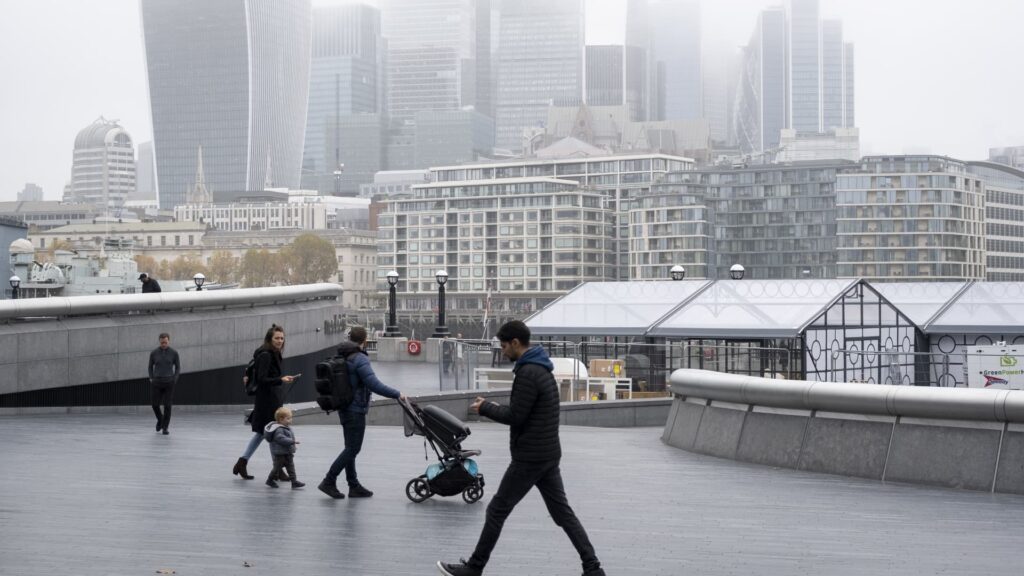November 6, 2024, Bank of England, City of London, London, England. The City of London is a city, county and local authority area that includes London’s main central business district, the CBD. The City of London is commonly referred to simply as the City and colloquially known as the Square Mile. (Photo by Mike Kemp/In Pictures via Getty Images)
Mike Kemp | In Photography | Getty Images
Britain’s economy unexpectedly contracted in September, growing only modestly in the third quarter after a strong recovery at the start of the year, initial figures showed on Friday.
Gross domestic product (GDP) fell by 0.1% in September, after increasing by just 0.2% the previous month, the National Statistics Office said. Economists polled by Reuters had forecast a rate of 0.2% in September.
In the third quarter as a whole, the UK economy grew by just 0.1% quarter-on-quarter. This was lower than the 0.2% growth expected by economists and follows 0.5% growth in the second quarter of this year.
The UK’s main services sector also grew by just 0.1% in the quarter, according to the Office for National Statistics. The construction industry increased by 0.8% in the same month, but production decreased by 0.2%.
This comes after UK inflation plummeted to 1.7% in September, falling below the Bank of England’s 2% target for the first time since April 2021. The decline in inflation helped pave the way for the central bank to cut interest rates by 25 basis points on November 7, bringing the key interest rate to 4.75%.
The Bank of England last week predicted that the Labor government’s tax hike budget would boost gross domestic product (GDP) by 0.75 percentage points over the next year. Policymakers also noted that the government’s fiscal plans led to higher inflation expectations.
British Finance Minister Rachel Reeves said on Friday she was “not happy” with the numbers.
“In my Budget, I made the difficult choices to repair our foundations and stabilize our public finances. Now we can deliver growth through investment and reform, putting more jobs and more money in people’s pockets. of money, get the NHS back on its feet, rebuild Britain in a decade of national regeneration and secure our borders,” she said in the release.
Analysts pointed to the economy’s fundamental weaknesses and rising risks from geopolitical tensions as potential barriers to further growth.
Ruth Gregory, deputy chief UK economist at Capital Economics, said: “It’s clear that economic momentum is a little slower than we previously thought, with the economy growing in only two of the past six months. It’s surprising that they haven’t.”
“Despite September’s negative growth, overall GDP growth is expected to pick up in the coming quarters as government debt-funded spending boosts activity and the drag from high inflation and rising interest rates continues to wear off,” Gregory said. I expect that,” he added.
Suren Tiloo, economics director at the Institute of Chartered Accountants in England and Wales, said it was currently “unlikely” that there would be a rate cut at the BoE’s next meeting in December. He said inflation risks and growing global headwinds were likely to prevent policymakers from pursuing successive rate cuts.
“These numbers suggest that the economy started to boil even before the Budget, as weak business and consumer confidence slowed production in the third quarter, particularly in September,” Thiru said. said in an emailed comment.
The results of the recent U.S. election have created significant uncertainty about the impact that President-elect Donald Trump’s next term will have on the global economy. Trump’s proposed tariffs are expected to cause widespread inflation and hit Europe’s economy hard, but some analysts say they could present opportunities for the UK economy. .
Bank of England Governor Andrew Bailey last week said little about the central bank’s views on President Trump’s tariff policy, but he did note the risks surrounding global division.
“We’ll see how things go. I’m not going to prejudge what will or won’t happen,” he told reporters at a news conference.
of british pound In the London market, the currency was almost flat against the US dollar by mid-morning. The euro rose 0.4% against the pound following Friday’s GDP release.


